Q. I’m christened Roman Catholic, my son has just joined a Mormon group, he said that he is to be baptized in 14 days. What does this entail and what are their views on me being a Catholic?
Guest author Jared responds:
What a great question! My grandpa is also a christened Roman Catholic, and several years ago he was in the exact same situation as you when a few of his children (my mother included) decided to be baptized. Before I go into that, though, let me first focus on the preparation leading up to baptism, and what is to be expected concerning the baptism itself.
Preparing for Baptism
Before someone can be baptized in the Church of Jesus Christ of Latter Day Saints (“The LDS Church” or “The Mormon Church”) there are some common events that occur: meeting with the missionaries, praying for guidance, worshiping with the local church, and a baptismal interview.
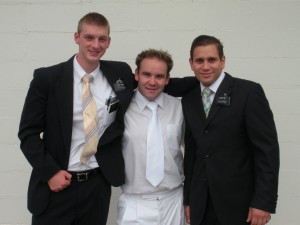 From the time the missionaries are introduced to someone who expresses interest in the Church, the missionaries will usually meet with the person a few times per week, sharing lessons about our beliefs concerning God, the Bible and the Book of Mormon, the history and organization of the church, God’s plan for us, the commandments, and what we must do to return to our Father in Heaven after this life. During each lesson the missionaries stress the importance of prayer and continually challenge the person receiving the lessons to ask our Heavenly Father in earnest, personal prayer if the things they’re being taught are true. The person receiving the lessons will be invited to attend church on Sundays where they’ll have the opportunity to meet the local church leaders and worship with us in our Sunday services. Once someone decides to be baptized into the LDS church, they continue to meet with the missionaries to help them continue to gain knowledge, grow in their faith, repent, and prepare to become a member of the Church.
From the time the missionaries are introduced to someone who expresses interest in the Church, the missionaries will usually meet with the person a few times per week, sharing lessons about our beliefs concerning God, the Bible and the Book of Mormon, the history and organization of the church, God’s plan for us, the commandments, and what we must do to return to our Father in Heaven after this life. During each lesson the missionaries stress the importance of prayer and continually challenge the person receiving the lessons to ask our Heavenly Father in earnest, personal prayer if the things they’re being taught are true. The person receiving the lessons will be invited to attend church on Sundays where they’ll have the opportunity to meet the local church leaders and worship with us in our Sunday services. Once someone decides to be baptized into the LDS church, they continue to meet with the missionaries to help them continue to gain knowledge, grow in their faith, repent, and prepare to become a member of the Church.
Just before a person gets baptized, they have a baptismal interview. This is a one-on-one meeting with someone who has been ordained to give these interviews (for your son it will likely be a full-time missionary other than those who taught him the lessons). This isn’t like a job interview or an interrogation looking for faults. The purpose of this interview is simply to ensure that the person is really ready to be baptized – that they have prayed and received personal confirmation from the spirit that the things taught to them by the missionaries are true, that they understand and are obeying the commandments, and that they have repented of past transgressions.
What to Expect at the Baptism Service
The baptism service will begin with a prayer. A few people may have been asked beforehand to say a few words or share their musical talents by singing a religious song or playing an instrument. Then the actual baptism will take place.
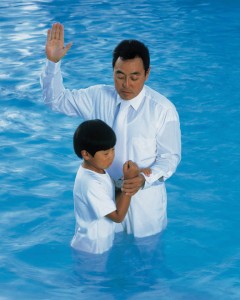 The baptism itself will be very simple. Clad entirely in white to represent the cleansing through repentance and baptism, your son and the person performing the baptism (probably one of the missionaries who taught your son, or a local church leader or friend) will enter the baptismal font (a small pool of water usually around 3 feet deep). The person who baptizes your son will take him by the wrist and raise his right hand while he says the following prayer: “<Your son’s name>, having been commissioned of Jesus Christ, I baptize you in the name of the Father, and of the Son, and of the Holy Ghost. Amen.” Your son will then lean back and be fully submerged in the water for a moment, then brought back out of the water. This act symbolizes the death and resurrection of Jesus Christ, the beginning of a new life, and the washing away of past sins.
The baptism itself will be very simple. Clad entirely in white to represent the cleansing through repentance and baptism, your son and the person performing the baptism (probably one of the missionaries who taught your son, or a local church leader or friend) will enter the baptismal font (a small pool of water usually around 3 feet deep). The person who baptizes your son will take him by the wrist and raise his right hand while he says the following prayer: “<Your son’s name>, having been commissioned of Jesus Christ, I baptize you in the name of the Father, and of the Son, and of the Holy Ghost. Amen.” Your son will then lean back and be fully submerged in the water for a moment, then brought back out of the water. This act symbolizes the death and resurrection of Jesus Christ, the beginning of a new life, and the washing away of past sins.
There will then be a few minutes of waiting and quiet conversation while your son changes into dry clothes before he comes back and rejoins everyone. Someone (probably a local church leader and possibly even your son) may say a few final remarks, then there will most likely be a song and prayer to close the service.
The final step of baptism is to receive a blessing by the laying on of hands (those giving the blessing put their hands on the head of the person receiving it), confirming the individual a member of The Church of Jesus Christ of Latter Day Saints and commanding him/her to receive the Gift of the Holy Ghost. This “confirmation” often takes place during Sunday worship services soon after the baptism, but it’s not uncommon for it to be performed immediately after the baptism as part of the baptism service.
The Baptism Service and You
Anyone (regardless of religious affiliation) who would come to witness and support those in their decision to be baptized are heartily welcomed! This is especially true for family and close friends of the individuals being baptized. As I mentioned, My grandfather, like yourself, is a christened Catholic and he’s attended the baptisms of several of his children and grandchildren into our faith; additionally, whenever he comes to town to visit he always attends Sunday worship services with us. He is not interested at this time in being baptized himself, but he enjoys attending church with us and always feels welcome.
I sincerely hope that if you are able to attend your son’s baptism, that you do! It would give you an opportunity to support your son in this important event in his life, to witness for yourself what he’s embarking on, and to meet his church leaders and friends. If you are able to attend, I challenge you to keep an open mind and be conscious of your feelings during the service; you may be surprised at the peace you feel as your son begins this new chapter in his life.
If you have any further questions about your son’s decision, don’t hesitate to ask. If you would prefer a more direct question and answer opportunity, feel free to contact the full-time missionaries in your area; when I served as a full-time missionary I loved the opportunity to answer questions of the family and friends of those whom I taught, and I’m confident those in your area would feel the same.
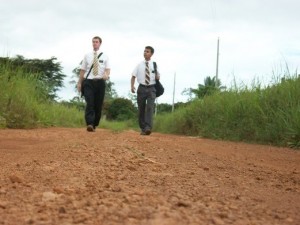
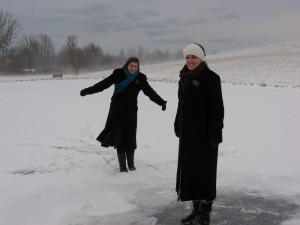
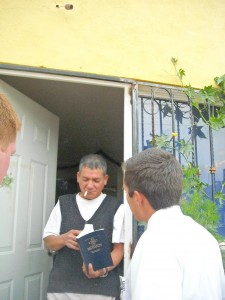
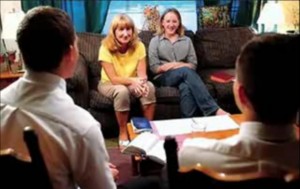

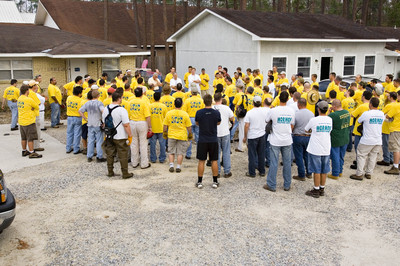 The common anecdote told goes something like this: In the aftermath of a hurricane, a young lady is being interviewed by a TV reporter and he asks her who she has seen getting involved in the cleanup. She responds: “There were two groups here right away–the Mormons and the LDS church.”
The common anecdote told goes something like this: In the aftermath of a hurricane, a young lady is being interviewed by a TV reporter and he asks her who she has seen getting involved in the cleanup. She responds: “There were two groups here right away–the Mormons and the LDS church.”